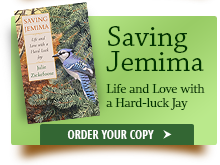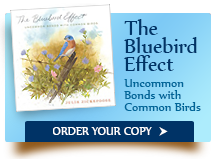On Starlings, Compassion, and the Why of Wildlife Rehab
Sunday, May 31, 2015
It's May 25 as I write, and this ought to be fledging day for the three baby starlings Cynthia and I saved from almost certain death on the black mulch of an Applebee's.
Far as I know, they're plying the skies over Marietta now, voicing harsh churring calls, having soundly beaten the odds, with a lot of help from their friends.
On May 15, five days after we rigged up the makeshift nest box and installed the babies, brave, good Cynthia Starling went back to check on them. She found the parent starlings going in and out of the box, which had worked itself loose from where I'd wedged and taped it (no wonder, with three growing baby starlings bouncing around in it, and two chunky parents coming and going!). She messaged me to say it was "hanging by a thread" and she was going back that evening to reinforce it with bungee cords. I knew she was good as her word.
I marveled at the multiple small miracles here.
First, that Cynthia had found a perfect stranger on Facebook through other friends, one who knew what to do (allow the birds' natural parents to raise them) and what not to do (drive the durn things 140 miles to Columbus to take up a wildlife rehabilitator's time).
Second, that I'd happened by Applebee's just as Cynthia had arrived to look for the nest, only to find two more stranded baby starlings.
And at the precise moment she was messaging me about it, I walked up and introduced myself.
Poof! It's Zick!
Third, that we'd come up with a solution that actually worked. And that the Applebee's manager had looked the other way, bless him, as we crawled around in the shrubbery tearing up nightcrawlers. feeding starlings and making a bird nest box, watched by dozens of curious patrons of that fine establishment.
Miracle the Fourth: The starlings overcame their fear to visit my cobbled-together nestbox and raised the babies to fledging age.
The question remains, why would anyone do all this for three baby starlings?
Everybody knows starlings aren't worth saving. Starlings displace native cavity nesters; there are way too many of them, and they don't belong here anyway. Do we really need more starlings in the world?
(Readers in the UK, where starlings are native and on a mysterious, precipitous longterm decline, are saying YES!)
But we emphatically don't need more starlings outcompeting native cavity nesters in the U.S.A. Ask any flicker, red-headed woodpecker, purple martin or bluebird.
All true. But there are other forces at work here that strongly motivated me to intervene. And as I think about it, there are two forces that make me do this at all, for any bird, turtle, squirrel, what have you.
First is the inability to let a creature suffer without trying to help it. That's #1. Either you have that inability or you don't. I am richly endowed with that inability. Clearly, so is Cynthia.
Second, and probably more important in the big picture, is that wildlife rehabilitation is for the benefit of people, even more than it is for the wildlife being saved.
A certain percentage of all wild creatures born is bound to die. The natural fecundity of starlings more than makes up for three left to writhe on the mulch under an awning at Applebee's, a drama played out probably thousands of times each spring under hundreds of restaurant awnings nationwide. Even that bald eagle seen on the evening news, painstakingly brought back from being shot and released with great fanfare in a public ceremony, doesn't really "matter" in the grand scheme of things, if you ask a population biologist. There are more bald eagles hatched every year to take its place. I hate to say it, but on a wildlife population level, rehab is essentially meaningless, unless you're dealing with something critically endangered like whooping cranes, where an individual is a significant percentage of the population.
What is not meaningless is the people who care about wildlife. What is meaningful is that they cared enough to seek help for some hapless thing they've found. And to me, it doesn't matter if what they found is a house sparrow lying naked on a sidewalk, a starling found under an awning, or a peregrine falcon that has hit a window. What matters is honoring that they care. And in honoring them, carrying forward and spreading the compassion in ever-widening ripples on this big, often cruel, pond.
I stopped to help and build a nestbox and risk the wrath of a restaurant manager because I believe the world needs more people like Cynthia, and those two little girls who took pity and moved the starling babies under the shrubbery. We all start off caring deeply about the little things. I remember crying over each and every black molly that was born and died in the 5-gallon aquarium I kept as a kid. I remember the funeral I held for Sailor Bob, the tiny red-eared slider I kept in a plastic tank with a plastic palm tree, that I fed Hartz Mountain dried flies and kept in the back bathroom until he croaked from malnourishment. I remember the moment I realized my that my mother thought I was being overly sensitive about these minor stars in what would eventually be a firmament of pets. I was about eight, and I couldn't understand why she wasn't as upset as I about the fish, the turtle, the squashed mantis, the hurt baby bird. Well, when you're old enough to have an 8-year-old, and you've had five kids before she was born, and the eldest of them had to leave you when he was four, you've long since learned to ration your tears. You've seen real hardship and tragedy and you've known real sadness, and a floating fish doesn't qualify as tear material any more.
I understand that now. I get it, Mom. I was a huge pain in the butt, and I thank you for putting up with me, for nurturing the passion for wild things that still knows no bounds.
But knowing what's worth crying over doesn't mean the caring has to stop. Nor should it.
I went by the Applebee's not because I love starlings. (Even though I secretly do.)
I did it because I love people like Cynthia Starling, people who care. She didn't know what it was, she just knew it would die without her help.
photo by Liam Thompson
Postscript: These photos taken May 27, 2015, three days after Cynthia reattached the dangling nest box full of about-to-fledge starling babies.
Two churring gray juveniles with both parents, just above the nestsite in the middle slot. I could hardly believe I saw this and got this bad iPhone shot.
This is their foraging habitat. Which is amazing in itself, that any bird can consider a restaurant, a parking lot and a tiny patch of grass like this "habitat."
|
Widget for blogger by Way2Blogging | Via Spice Up Your Blog Gadgets
|













17 comments:
In the past I've sent the 'starfish parable' to a rehabber friend, and have even linked to it in your comments before JZ, but I'll do so again for any unfamiliar with it (in its original form it came from Loren Eiseley):
https://s-media-cache-ak0.pinimg.com/736x/a0/d9/00/a0d9007ed4af32ff60ccb5226f64978c.jpg
I'm so glad that they are doing well! The entire episode shows that Magic does exist! Oh, we may call it coincidence... or synchronicity... or whatever label you want to slap on it. I prefer "Magic". And it seems that the more you believe in it, the more it happens to you. If you don't believe in it, your perceptual filter will not see it. How glum that must be!
I'm a new reader. I feel exactly the same way about starlings - and I can't stand for any creature to suffer. I'm forever stopping to move turtles out of the road here in Indiana. But you have the rehab expertise to really make a difference. Plus an artist's sensitivity and ability to capture the beauty in every day. �� I'm a huge new fan, so glad to have discovered a kindred spirit.
I'm a new reader. I feel exactly the same way about starlings - and I can't stand for any creature to suffer. I'm forever stopping to move turtles out of the road here in Indiana. But you have the rehab expertise to really make a difference. Plus an artist's sensitivity and ability to capture the beauty in every day. �� I'm a huge new fan, so glad to have discovered a kindred spirit.
Thank you for writing about why it is important to rescue animals. In February my 12 year-old daughter who LOVES frogs found a tree frog on a sidewalk in an industrial area, nothing but concrete and buildings to be seen. It was below freezing and the frog was almost black and barely moving. Our dinner plans were abandoned and our frog rescue began. Calls to our local wildlife rescue were never returned (we didn't expect them to take a frog but hoped they could tell us what she needed) so we went to Petsmart where a very helpful young man told us what pet tree frogs ate and what kind of housing they required. Jumper (named because she was found outside a trampoline gym) stayed with us for a few months, scarfing up tiny crickets and winning hearts, including my mother's, who frog sat when we went on vacation. Searching online I found Blue Ridge Wildlife Center (where they do take frogs and toads!) who graciously responded to my email with advice about when to release her. It was so hard to let her go but both my girls could see her joy at being free. We have seen her hanging out on our porch a few times (my daughters leave the porch light on all summer to attract bugs and we have quite a few porch frogs, and a house covered in bug carcasses, whee!) I am so glad we did this and phooey on everyone who rolled their eyes at our frog rescue! I hope we did what was est for Jumper and I love that my girls will go out of their way to help any animal. My younger saved a large cricket from the cat and set up a cricket hospice for it. Children who care for animals, even the ones most people think are not worth the time and effort, will grow up to be people who care for people who others can't be bothered with.
JZ--your starling story is such a balm to my animal loving soul. I am always on the edge of being hopelessly heart-broken about how we humans (talk about invasive species indeed) have wrecked havoc on our fellow creatures.
Poachers with machine guns systematically wiping out the world's population of elephants. SOB
Nations which pursue and kill whales for "scientific research." SOB
Rich people who spend hundreds of thousands of dollars for the "right" to kill a black rhino. SOB
Villagers who set snares to trap the "valuable" animals in southeast Asian forests and in the process practically wipe out the world's population of the saola. SOB
Companies that cut down native forests leaving orangutans without habitat. SOB
And sob again and again.
I try to read these stories--it is important to be informed--but I am so overwhelmed with this incredible unjustified mindless slaughter.
SO, thank you thank you thank you--for the starlings, for all the birds and other creatures you rescue. And most of all--thank you for reminding us that how WE treat animals does something to our souls.
I have that inability, and it is a hard cross to bear in this ol' world, but I wouldn't want to NOT CARE – what a selfish existence! I do dread baby bird season, as I have had so little luck in helping them; the last time my son found one (in bad shape) I burst into tears at the piece of my heart I knew it was going to take when it died....
I've always been of the -leave the alone school, unless of course, I personally come across a baby - but anything that helps develop compassion in humans has to be a good thing. Of course, when I see a starling fighting a red-bellied woodpecker and the starling is on top of the woodpecker on the ground, I don't have much compassion for the starling.
Once again, beautifully said, Julie. So glad you're in the world. Time and again, your stories make my day!
Thanks, as always, Julie. I am told chickadees are a dime a dozen, but I still care for each one I see. Each animal matters.
What Jen said. As a mental health worker (retired) it is so true. Must instill care for living things in young children. We saved 2 starling babes at the Pilgrimage this weekend. Would I rather have saved a warbler baby? Yes, but we saved (or tried to save) lives.
When I was a kid I lived in Iowa on a few acres in the country. Later my parents divorced and I moved out of state with my mom, but I would go back to my dad in Iowa for the summers. One summer when I was 11 or 12 my dad and step-mother were raising chickens, and each morning I liked to feed them. Normally we kept them in a coop, but some reason we had them in one of our barns that year. Well that was a mistake; I walked down there one morning to find every single one of them killed, probably by raccoons. I ran and got my step-mom and we went back to the barn for her to look over the grisly scene I had found. After looking around for a bit, I don't remember how we discovered it, but we found a baby bird on the floor. We were lucky we ever even saw it. The poor thing was small and pink and had fallen near a wall. We had know idea how long it had been there.
We brought the baby bird into our house and put it in a box with straw in my room. We took a long piece of straw and put a chuck of ground meat on it and poked it gently on it's mouth, (We didn't know exactly what to feed it and were making our best guesses.) and it gobbled it up and passed out. And that began a two week job of me feeding that little booger constantly from about 4:00 or 4:30 in the morning until sometime in the evening. He (or she) had no hesitation in loudly chirping before the crack of dawn to get me started feeding it, and chirped all day long.
After a day or so of trying to raise the little bird, my dad suggested I put my clock in its box. It was an old wind up alarm clock, with the bells and all. But it ticked loudly. I put my clock in there, and the baby ended up crawling up to it and slept everyday nestled up to my clock.
He thrived and grew and eventually it was time to let him go. My dad wasn't really sure what kind of bird he was, just "some kind of sparrow" was his guess. I didn't think a whole lot more about it. We let him go near some apple trees, and I like to hope he did well.
I can't remember clearly what the bird looked like, and we never took pictures. But the sound of its chirping is engrained in my memory, and after listening to tons of bird songs, I think now it was a House Sparrow. (Though who knows, I'm no expert.) And in some ways I feel a little guilty about that. But your post helps in alleviating some of that guilt. Which is why I've written this very long, wordy comment. Had we known it was a house sparrow then, could we truly have just left the poor thing to die? Especially on that morning of all mornings, where I had just found all our chickens dead? There was this one lone living soul still in that room alive. I could never leave anything to just die when I could maybe help.
All of this is to say that your story about the starlings really resonates with me.
I went today to check on the box. it has been removed...hopefully everything has gone as planned :)
Yep, Heather McC, you're right, that was a house sparrow, as there are only a couple of species of birds that would nest in a barn and fall to its floor. They're tough, smart little birds. Thank you for sharing that story. I love it when the comments take on a life of their own and people give their stories, too. It always amazes me how, using only common sense, people manage to raise baby birds to release age. You did well. I sense it was well worth doing, and somehow eased the blow of losing all your chooks in one disaster. Sigh. This is why I don't keep chickens.
Your rescue goodness helps balance all the other stuff in the world. A tip on the scale of goodness. My heart thanks yours.
Thanks for your caring and showing the end of this story. I can't bear to watch things suffer either. And who could resist those yellow clown mouths anyway?! I had no idea how baby starlings looked.
And I've watched our Northern Flicker compete with the starlings for our sycamore tree cavity for the past 3 years. They won once.
Love the "bag of guts." They really are hideous. And yes, they are bullies, and hugely successful here. And oh how I wish some days when I leave my Philadelphia apartment that the telephone wires were dotted with swallows, or flycatchers, or anything native. instead I have those darned starlings, clicking and clacking away.
Then, one will whistle, "you're here!" And the others chime in, and it makes me laugh and I whistle back. "We're here!" And they remind me that I am alive, and so are they, and isn't that something. Especially in this urban environment, where just 4 blocks from here gunshots sometimes fly between gangsters, and police helicopters sometimes circle overhead for hours. I'll take starlings. So will many city kids whose only experience with wildlife includes the starlings, sparrows and pigeons nesting in gutter holes and and roosting in the exposed rafters of rooftops. Bonus birds: chimney swifts!
Post a Comment